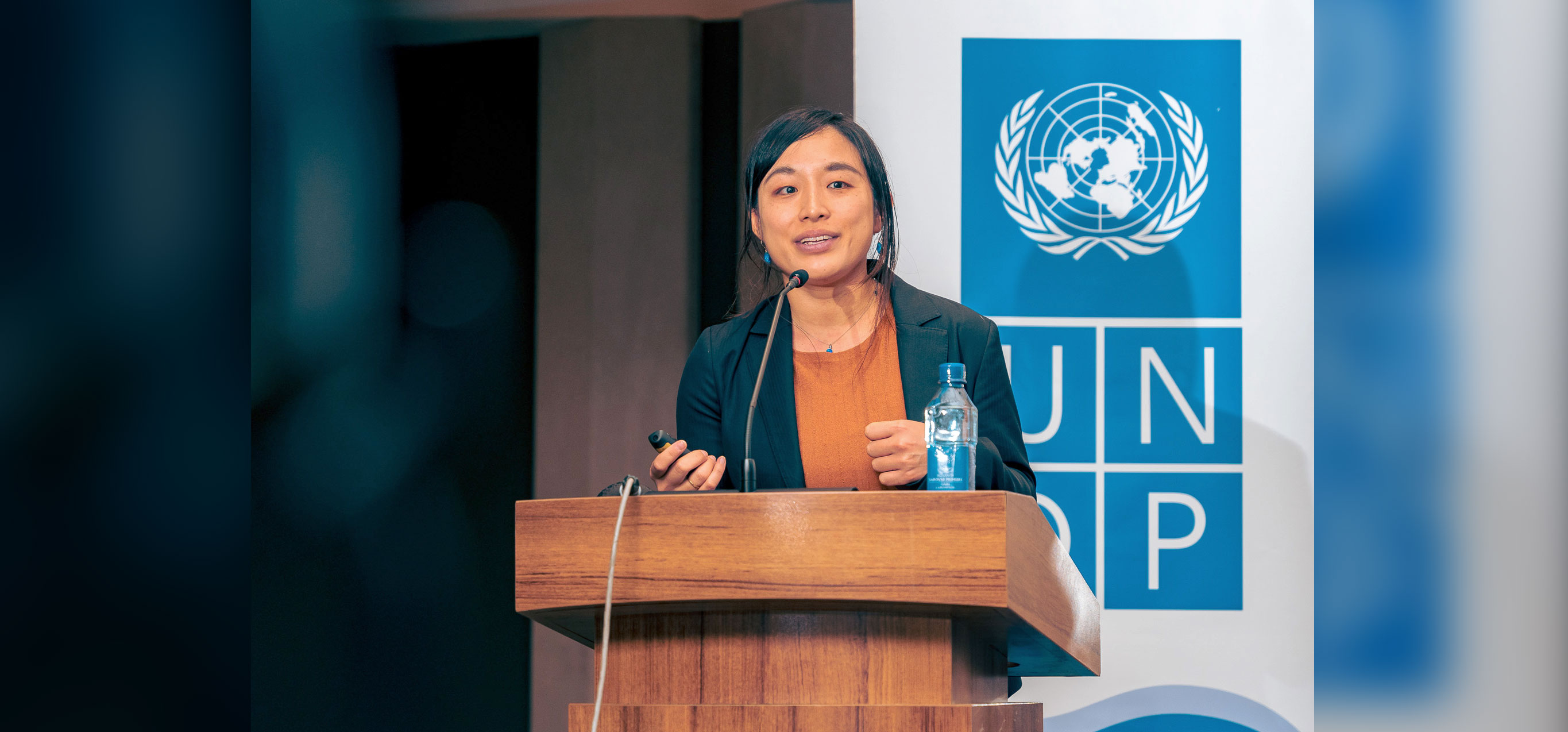
The College of International Relations provided a very valuable foundation for my career to date in the field of private sector development in Africa and for building the strong motivation that led me to join UNDP.
HARA Sachiko
Programme Analyst, UNDP Sustainable Finance Hub Regional Office (in South Africa) (International Relations Major Alumnus 2013)
HARA Sachiko was born in Japan. After graduating from Ritsumeikan University in 2013, she joined Fujitsu Global in Tokyo. She later served as a JICA Overseas Cooperation Volunteer in Malawi, providing business support in rural areas. She then earned a master’s degree from the Institute of Development Studies (IDS), University of Sussex, in the UK.
Sachiko has worked with Japanese startups addressing social issues in Tanzania and other countries, as well as with a venture capital firm focused on Africa. Since 2019, she has worked with the Japan International Cooperation Agency (JICA) in its headquarters and in Ethiopia as a startup expert, contributing to the Project NINJA initiative to support African startups.
In January 2024, as a JPO, she began promoting support for startups and small and medium-sized enterprises at the UNDP Africa Sustainable Finance Hub (ASFH) Regional Office.
Please share your career after graduation from Ritsumeikan University.
HARASince my university days, I have been particularly interested in economic disparities between regions. My experiences as a backpacker in India and Vietnam heightened my awareness of the significant impact that differences in natural environments and regional conditions can have on people’s lives. These experiences sparked my desire to pursue a career dedicated to addressing issues of income inequality and disparities in opportunities.
After graduating, I chose to study business and began my professional career as an IT consultant at Fujitsu Limited. However, I was eager to gain firsthand experience in Africa, so I joined the Japan International Cooperation Agency (JICA) as an Overseas Cooperation Volunteer. During this time, I worked with a group of over 300 rural farmers in Malawi to establish a business. While supporting efforts to improve local incomes, I was deeply impressed by the potential of the African people. In collaboration with the villagers, I helped develop an environmentally friendly charcoal business called briquettes, engaging directly with local people to formulate sales strategies and marketing approaches. Through this hands-on experience, I witnessed their enthusiasm and realized their high level of capability. This experience reinforced my desire to contribute to reducing economic disparity and promoting the development of Africa’s economy.
I became passionate about providing funding and business skills development opportunities to those who, despite their motivation and ability, struggle to access such resources due to their remote location. These experiences inspired me to pursue a career that would bridge Africa and Japan through business. I later joined JICA’s long-term overseas training program and studied international development through business at the University of Sussex, where I earned a master's degree in Globalization and Business Development from the Institute of Development Studies (IDS). I focused on ICT for development and researched rural development using ICT and innovation, particularly analyzing the effectiveness of mobile phone-based market information services in Africa. This research was a central part of my master's thesis, where I explored how startups in the region leveraged technology for rural development. I also took courses in economic development theory, business as a development actor, and impact evaluation, and participated in a short-term Professional Development course on Digital and Technology for International Development (ICT4D).
My growing interest in African startups solving social issues through business led me to work for several organizations in this field, including WASSHA, a Tanzanian startup, Samurai Incubate, a venture capital firm focused on Africa, and SIMI, an impact investment organization. These roles allowed me to gain valuable experience in both the startup ecosystem and the financial sector. Subsequently, I gained six years of professional experience leading Project NINJA, an initiative at JICA. In this role, I implemented acceleration programs for African startups, provided training for Ethiopian ministries, public and private companies, and startup ecosystem builders, and conducted extensive ecosystem research.
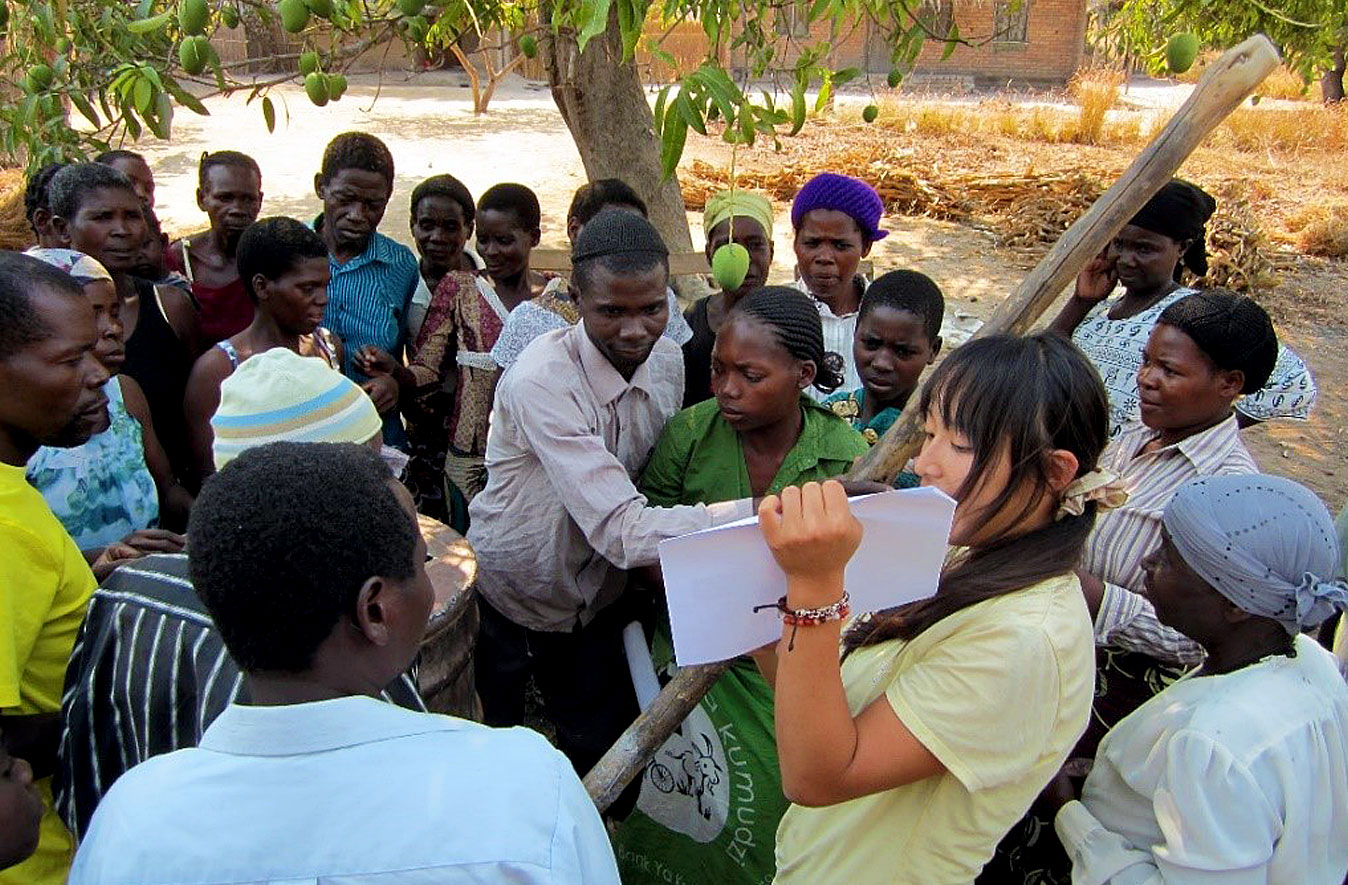
Please tell us about your current work. What led you to this profession?
HARAThe reason I joined the UNDP was because I had wanted to spend my life working to tackle economic and opportunity disparities caused by people's birth environment and other factors since I was at university. In order to realize this dream, I thought that I could take a broader approach at the United Nations, a multilateral aid organization, rather than at JICA, a bilateral aid organization, so I joined the UNDP Sustainable Finance Hub (SFH), in 2024. This Hub aims to achieve a sustainable society through finance and is active in 170 countries and regions.
I am currently working at the regional office of the Africa Sustainable Finance Hub (ASFH) in South Africa, supporting startups across Africa and working to improve access to financial services using impact investment and other methods. One of the programmes I am currently in charge of is called ‘Meet the Tôshikas.’ This programme connects Japanese investors with local African entrepreneurs and startups. This programme is supported by the Japanese Ministry of Economy, Trade, and Industry and has been implemented in Angola, South Africa, and Zambia since 2024.
The programme has produced a report mapping the African startup ecosystem and has been communicating the appeal of Africa to investors, as well as directly implementing a programme to support 30 startups in preparing for investment and matching them with Japanese investors and companies. The rewarding aspect of this work is that by connecting African startups with Japanese investors, we can bridge the gap between investors interested in developing countries and African startups that are struggling with a lack of funding and build a bridge between Japan and Africa.
While there are many startups in Africa with great potential, investment from Japan remains limited. In 2021, investment from the Asia-Pacific region to Africa accounted for only 9% of the global total, and the scale of this investment is very small. In addition to the physical ‘distance’, we believe that the psychological ‘distance’ caused by a lack of information about Africa and the high investment hurdles also have an impact. UNDP has offices all over the world and, as a development agency with a strong local presence, we play a role in connecting investors and companies in Africa with those in other countries, such as Japan. We are delighted to be able to support African startups as they grow and become important actors in solving the social problems that exist deeply in Africa by making full use of ICT and innovation. For Japanese investors and companies, Africa is still a place where business and legal systems are not fully developed, but this can be a place to try out new business models. I feel a great sense of fulfilment from this initiative, not only from the perspective of investment but also from the perspective of Japan and Africa learning from each other and growing together. For more detailed information, please refer to this UNDP’s website.
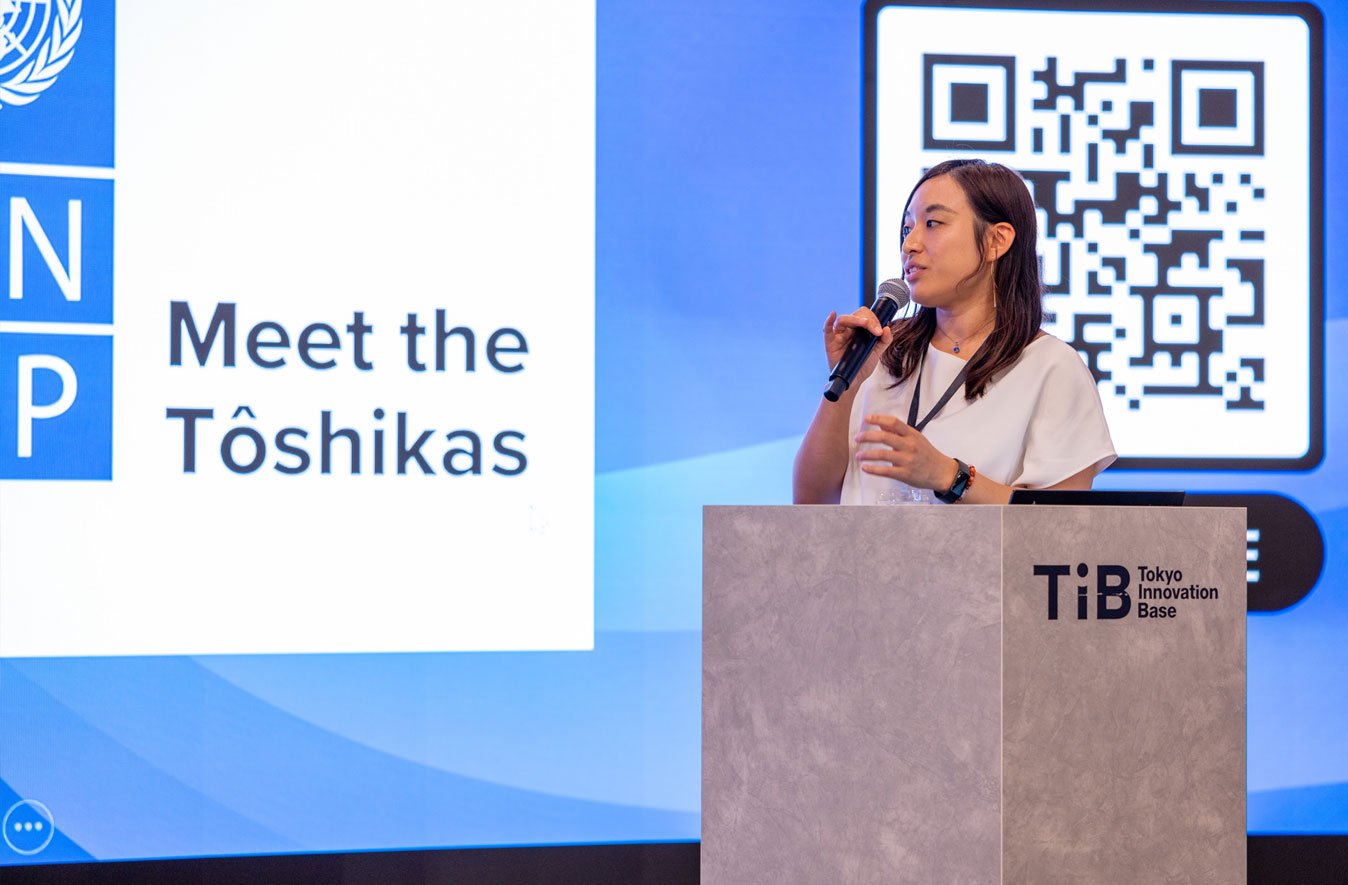
How does your experience while at the College of International Relations benefit you now?
HARAStudying at Ritsumeikan University's College of International Relations provided a very valuable foundation for my career to date in the field of private sector development in Africa and for building the strong motivation that led me to join UNDP. In fact, before entering university, I had spent my entire life in a rural area and had never been abroad, with very few opportunities to encounter foreigners. I chose to study international relations because I wanted to see more of the world and do meaningful work in the field, like a war photographer. At Ritsumeikan University, I met many different people and learned about new worlds, which helped me to deepen my understanding of my own interests and concerns, and I was able to develop my abilities by studying English and going abroad.
Ritsumeikan University provides students with a wide range of opportunities. When I first encountered the subject of international relations at university, I was shocked to find that there was such an interesting academic discipline, and I strongly felt that learning about different cultures, international support and cultural anthropology was extremely appealing to me. I was able to discover that learning new knowledge in a field that I like is such a fun thing to do. The teachers provided me with a lot of support, and for my graduation thesis I took on the challenge of researching a relatively new field at the time, ‘international cooperation using ICT’. When I was struggling, the teachers in my seminar group gave me a lot of advice and helped me out.
In addition, the teachers I met during my time at university, my international and highly motivated friends, and my seniors who were war correspondents and JICA volunteers taught me about the vastness of the world. Thanks to them, I was strongly encouraged to go abroad for the first time in my university days with a backpack. The courage to take that first step to travel to India alone led to me working in Africa for six years.
Outside of the classroom, Ritsumeikan University has many valuable platforms where you can gain new knowledge from people you would not normally encounter in your life. I participated in the Ritsumeikan University Special Program for the Development of Human Resources Active in International Society, also known as the Honors Program, where I learned perspectives, ideas and ways of looking at the world that I had never considered before from former diplomats.
Through these experiences, I was able to gain a new perspective, and by analyzing myself based on the content I learned, as well as my international experiences such as studying abroad in America for a year, backpacking, and interacting with international students, I realized that I wanted to work in an international job that would help to correct issues such as inequality of opportunity and economic disparity.
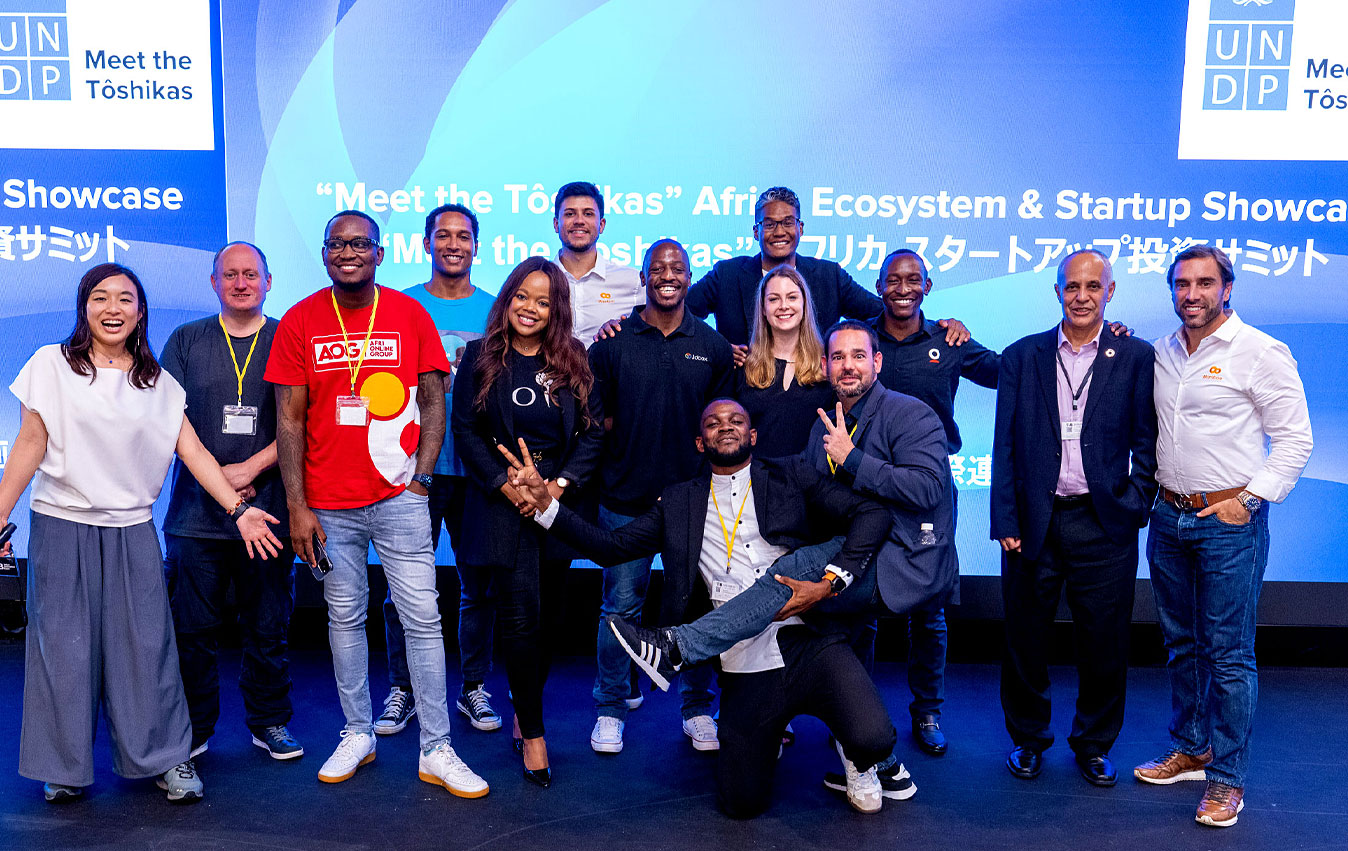
When looking back on your days at Ritsumeikan University, how do you find the College of International Relations attractive?
HARAThe appeal of Ritsumeikan University is that it provides a wide range of opportunities and ideas. There is a place that will support students who want to learn and grasp things with all its might. The appeal of international relations is that it is a place where people with diverse backgrounds and who share the same interests gather. There are students from diverse backgrounds, including Japanese people with various study abroad and residency experiences, international students from other countries, people with overseas roots, and people like me from rural areas who have no experience of living abroad. I really liked the fact that there was a culture of mutual acceptance and recognition of each person's uniqueness.
What is more important is that you can meet people who share the same interests and pursuits. For example, you can meet people who share your interest in the same themes, such as international cooperation, Africa, ESGs (environment, society and governance), developing countries, overseas business, the relationship between religion and culture, and cultural anthropology, and pursue your interests together in classes and in the common room. These topics may not be of interest to many people worldwide, but your fellow students studying international relations will share your interests and help you take the first step towards making your dreams a reality! During my time at university, I worked hard alongside many friends who shared my interest in international cooperation and Africa, and I still keep in touch with them and talk about work. At university, I was able to form very important personal connections.
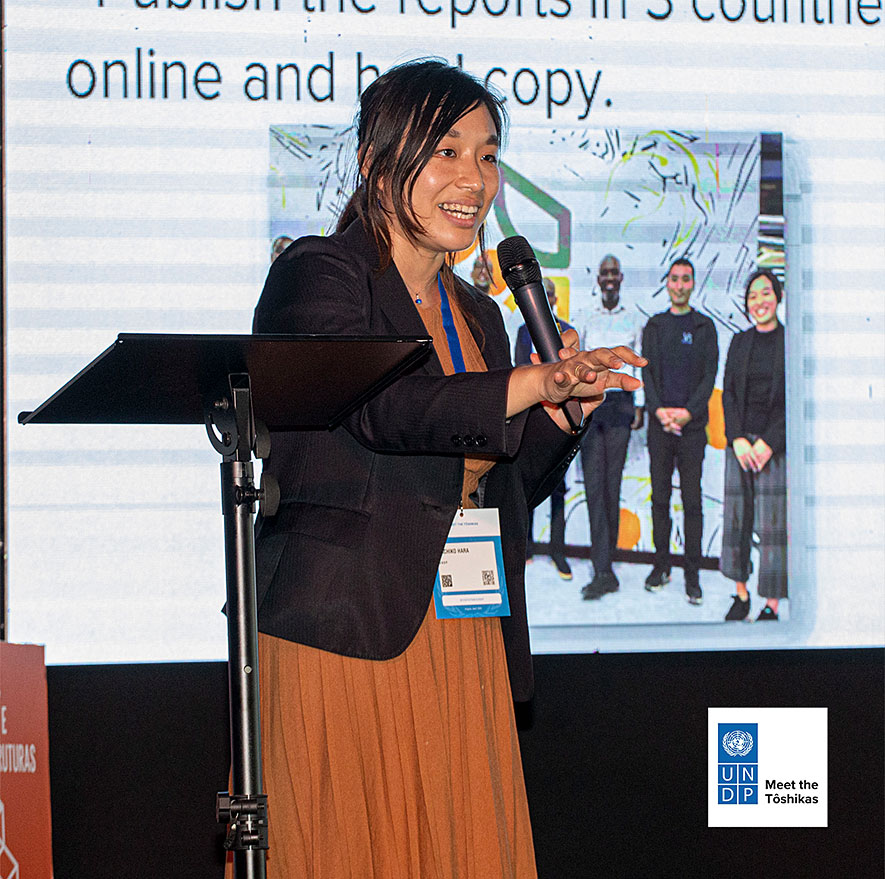
Could you send some messages to prospective and current students for the College of International Relations at Ritsumeikan University?
HARAI think that life is a series of choices. Where you go to university, what you study, and how you spend your precious four years as a university student are choices that will have a big impact on your future life. I have two pieces of advice for you, who are full of such possibilities.
The first is that ‘when making choices in life, it is important to always take the wheel yourself’. You may be influenced by money problems or the opinions of those around you, and you may also be troubled by the sheer number of choices you have. However, the answer is surely within yourself. I think it is important to be as honest as possible with yourself and to think about what you want to do with your one and only life and what you value and what your thoughts are. I try to have time to think about what I value and what I want to do with my notebook in hand. And I think it is important to believe in your choices and make the path you have chosen the ‘right answer’.
Secondly, I think it's important to design how you want to spend your four years at university, because they are very precious and short. There are many things you can do as a university student who has not yet joined a company and has no title. For example, it is easy to meet and talk to people from various backgrounds. Surprisingly, many people will respond if you contact them politely via social media such as LinkedIn, so try to create opportunities to talk to various people yourself. It is also a time when you can use your time freely for long periods of time. I used the money I had saved up from working part-time as a temp and my scholarship to travel as a backpacker and to take a year off from university to study abroad. University life is a precious four years that you can design relatively freely, so I recommend that you start thinking about ‘what you want to get out of university life’ from your first year and write down a schedule for each year in detail. I used my favorite diary to analyze what I wanted to do and make a four-year plan. To make the most of your precious university life, please think again about how you want to spend your time from a broad perspective!
If you have any questions or would like to contact me, please feel free to do so via LinkedIn.
November 2024
MORE INTERVIEWS
-
Bridging Japan and the US through International Relations and Language – My Four Years in the JDP and My Global Future
INADA Mimi
Fourth-year Joint Degree Program (RU-home)2025.2.25
studentlife|academics|studyabroad|jdp|
-
While technical knowledge and job-required skills can be learnt after being on the job, some skills, such as communication, presentation, data analysis, and visualization, are the skills I was able to learn from my time at Ritsumeikan.
Pranjal Modi
RIMOWA (Global Studies Major Alumnus 2022)2025.2.4
alumni|
-
Zemi Research Convention 2024“The Integration of Human Rights into International Environmental Law and its Implications”
Ochi Seminar
(team name: Environmental Justice Analysts)2025.1.6
academics|openseminar|
-
Zemi Research Convention 2024“Are Israel's actions in Palestine considered self-defence”
Ochi Seminar
(team name: The Prosecutors)2024.12.25
academics|openseminar|
-
This supportive community empowers you to step out of your comfort zone and take on numerous challenges throughout your university life.
SUZUKI Tomoya
SAP (International Relations Major Alumnus 2018)2024.12.11
alumni|
-
Surrounded by diversified nationalities of colleagues and external business relationships, this was essentially similar to what I experienced while studying in the College of International Relations.
Joyce Lo
Mindshare (Global Studies Major Alumnus 2017)2024.12.10
alumni|